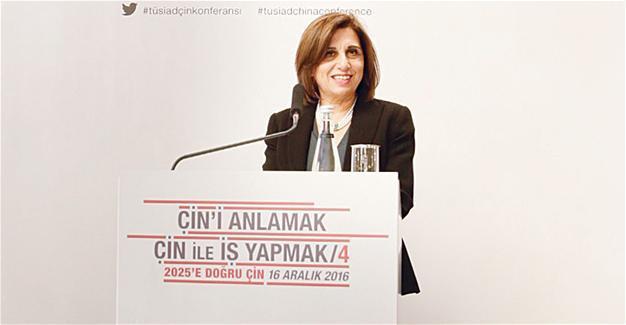Turkish bosses call for easing of China’s visa restrictions
ISTANBUL
 Turkey’s top business organization has called for an easing of visa procedures by China, in order to boost bilateral economic and trade ties.
Turkey’s top business organization has called for an easing of visa procedures by China, in order to boost bilateral economic and trade ties. “We attach great importance to accelerating the process in the Visa Facilitation Agreement with China in order for our bilateral trade and investment ties to get a greater boost,” Turkish Business and Industry Association (TÜSİAD) head Cansen Başaran-Symes said at a conference on Dec. 16.
“Since 2016, much tighter visa procedures have been introduced by China for Turkish citizens, and it has become more difficult for Turks to obtain visas,” she added in a speech at the Understanding China and Doing Business with China conference, organized by TÜSİAD and its joint economic research forum unit at Koç University.
Başaran-Symes also praised the completion of a 450 million Turkish Lira ($132.55 million) swap transaction at the end of November by the Turkish unit of Chinese lender ICBC.
“China now constitutes 15 percent of the global economy with a GDP of $10.86 trillion in 2015. Its contribution to global economic growth is 25 percent. This is a very important figure, and is expected to further rise in the next five years,” she said.
Başaran-Symes said the impact of the Chinese yuan has been growing since last year, when the yuan was included in the IMF’s currency basket. But she also underlined recent slower growth rates in the Chinese economy.
“Double-digit growth figures were replaced by the ‘new normal’ of economic growth at 6.9 percent in 2015, which is expected to be around 6.7 percent in 2016. In this new model, the pendulum has swung more to domestic consumption innovation and high-tech industries, rather than exports and investment spending,” she said, adding that China is becoming a high-tech industry producer.
She noted that China is Turkey’s second largest trade partner with a trade volume of more than $27.3 billion in 2015. This relation is highly in favor of China and Turkey needs to diversify its exports to China, she added.
“Many cooperation agreements between China and Turkey were signed over the last months in many fields, from energy and nuclear safety to horticultural health. As TÜSİAD members, we are very happy about these developments,” Başaran-Symes said.
Recalling that the Turkish unit of ICBC completed a 450 million lira swap transaction at the end of November, marking the first such deal under an agreement between the two countries.
China and Turkey renewed their bilateral local currency swap agreement for a further three years in November 2015, and increased the swap line from 10 billion yuan to 12 billion yuan.
“We believe that the ICBC Turkey’s move is of great importance to boost our bilateral trade relations and hope to see more would follow this step,” said Başaran-Symes, noting that tourism also offers great opportunities for entrepreneurs from both countries.
















